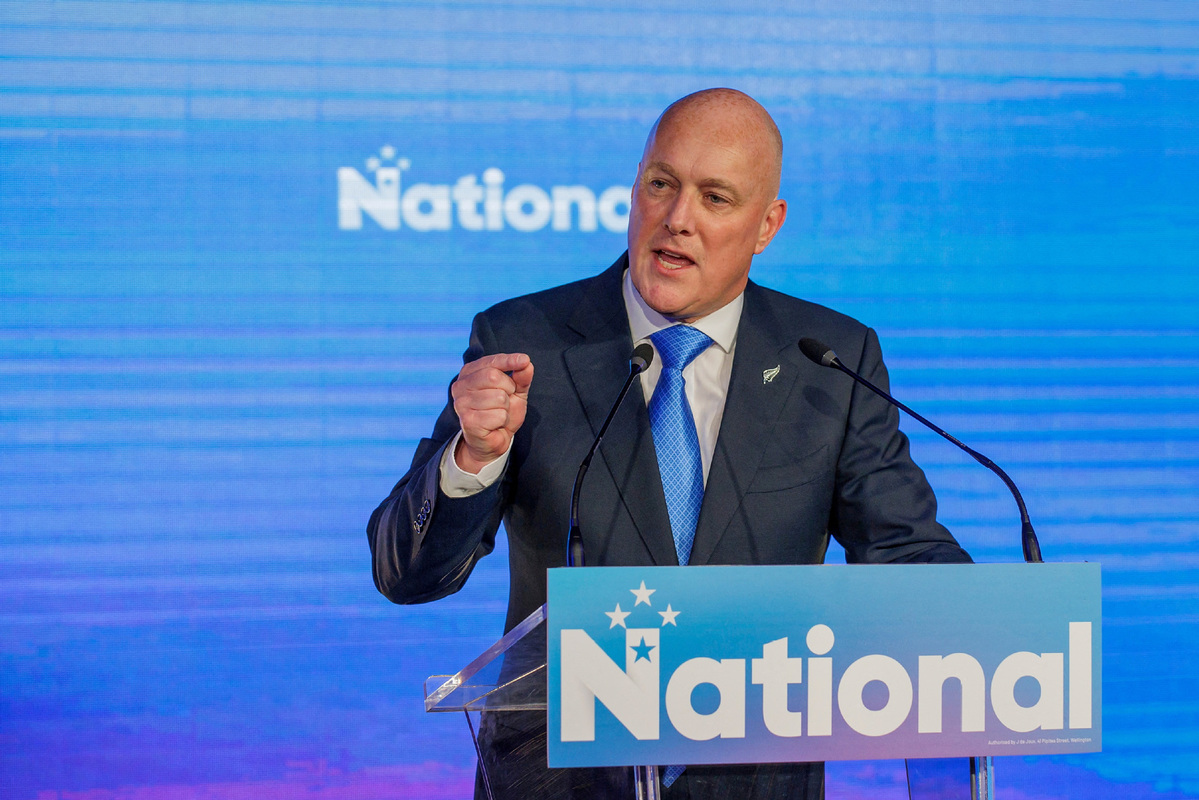NZ coalition government takes power as experts warn of challenges ahead
By KARL WILSON in Sydney | chinadaily.com.cn | Updated: 2023-11-27 19:20

Eight weeks after elections New Zealand now has a government headed by former businessman Christopher Luxon. He, his two deputies — New Zealand First leader Winston Peters and ACT Party leader David Seymour — and his Cabinet were sworn in on Nov 27.
Political analysts said Luxon, who has only been in politics since 2020, has an unenviable task as he tries to rebuild New Zealand's broken economy while balancing a three-party coalition government.
The two junior coalition partners will share the deputy prime minister's role, with Peters taking the first half of the parliamentary term. The 20-member cabinet comprises 14 National ministers, three ACT ministers, and three New Zealand First ministers.
Professor of Politics at New Zealand's Massey University Richard Shaw said he expects the cost of living will be the key focus of the new government.
However, as was the case with the previous government, "there are relatively few levers the government has at its disposal to influence this," he told China Daily.
"The government's primary response will be via tax cuts (although funding these remains a concern), which may fuel rather than dampen demand."
On foreign policy, Shaw said he did not expect any major changes.
He said on the big issues such as China and trade "there tends to be broad bipartisan support".
Geoffrey Miller, a geopolitical analyst with the University of Otago, said the National Party's business-friendly position and strong rural base "should help to keep in check" the more ideologically-driven, pro-US position likely to be taken by Winston Peters who will be looking to resume the "Pacific Reset" strategy he began as foreign minister in 2018.
"China remains New Zealand's biggest trading partner by some margin and is likely to remain so for the foreseeable future," he told China Daily.
"We should expect an economic-focused foreign policy from the new government, which will dovetail with voters' concerns over cost-of-living issues," he said.
Alistair Crozier, executive director of the New Zealand China Council, said China remains a very important bilateral partner for New Zealand.
"Something which has been recognized by successive governments in New Zealand over the last two decades and more.
"We look forward to hearing the new government's foreign policy objectives."
Stephen Jacobi, executive director of the NZ International Business Forum said the new government "has an ambitious policy program made up of three parties' election commitments".
Internationally, Jacobi said he expected there will be a "lot of continuity in policy."
But the big question is just how the country's first three-party coalition government will work.
"Given the new prime minister's inexperience, the historical antipathy between the two deputy PMs, and the policy differences between the parties – there is considerable room for tensions to emerge," Shaw, from Massey University, said.
He noted Peters might be "unpredictable" and cause tension with his coalition partners, while Luxon has only been in politics for three years so the learning curve "will be steep".
"He is used to the chief executive role. He is not used to having to manage relationships in which political power is distributed," Shaw said, noting there will be challenges to his authority.
Jacobi said the new government will be working off the basis of separate and detailed coalition agreements between the majority National Party and minority ACT and NZ First Parties.
"Luxon has expressed confidence that the three parties and their leaders are fully aligned around delivery," he said, noting that minor parties with ministerial appointments know that stability will keep them in power.
He said Luxon has pointed to his extensive corporate career as evidence of his leadership skills.
"He has certainly united the National Party and, following protracted and likely difficult negotiations, has now delivered a government able to command a majority in the House.
"While the focus now has to turn quickly to effective and timely implementation, this is quite an achievement in difficult circumstances," Jacobi said.
Otago University's Miller said: "Luxon remains something of an enigma and his rapid ascent to the role of Prime Minister has not been marked by any real enthusiasm from voters for him personally — a sharp contrast with both Jacinda Ardern and John Key.
"However, this is also very much in keeping with the times — New Zealand voters appear to be collectively grumpy, tired, and frustrated and just want a government that can deliver results. In this case, having a manager rather than a charismatic figure at the top may work quite well."
























